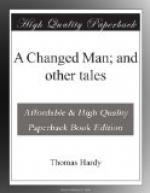’Shortly after this he came with a resigned look on his face. “It is as I expected,” he said. “I have received a hint to go. In good sooth, I am no Bonapartist—I am no enemy to England; but the presence of the King made it impossible for a foreigner with no visible occupation, and who may be a spy, to remain at large in the town. The authorities are civil, but firm. They are no more than reasonable. Good. I must go. You must come also.”
’She did not speak. But she nodded assent, her eyes drooping.
’On her way back to the house on the Esplanade she said to herself, “I am glad, I am glad! I could not do otherwise. It is rendering good for evil!” But she knew how she mocked herself in this, and that the moral principle had not operated one jot in her acceptance of him. In truth she had not realized till now the full presence of the emotion which had unconsciously grown up in her for this lonely and severe man, who, in her tradition, was vengeance and irreligion personified. He seemed to absorb her whole nature, and, absorbing, to control it.
’A day or two before the one fixed for the wedding there chanced to come to her a letter from the only acquaintance of her own sex and country she possessed in England, one to whom she had sent intelligence of her approaching marriage, without mentioning with whom. This friend’s misfortunes had been somewhat similar to her own, which fact had been one cause of their intimacy; her friend’s sister, a nun of the Abbey of Montmartre, having perished on the scaffold at the hands of the same Comite de Salut Public which had numbered Mademoiselle V—’s affianced among its members. The writer had felt her position much again of late, since the renewal of the war, she said; and the letter wound up with a fresh denunciation of the authors of their mutual bereavement and subsequent troubles.
’Coming just then, its contents produced upon Mademoiselle V—– the effect of a pail of water upon a somnambulist. What had she been doing in betrothing herself to this man! Was she not making herself a parricide after the event? At this crisis in her feelings her lover called. He beheld her trembling, and, in reply to his question, she told him of her scruples with impulsive candour.
’She had not intended to do this, but his attitude of tender command coerced her into frankness. Thereupon he exhibited an agitation never before apparent in him. He said, “But all that is past. You are the symbol of Charity, and we are pledged to let bygones be.”
’His words soothed her for the moment, but she was sadly silent, and he went away.




